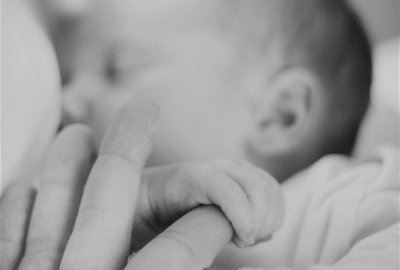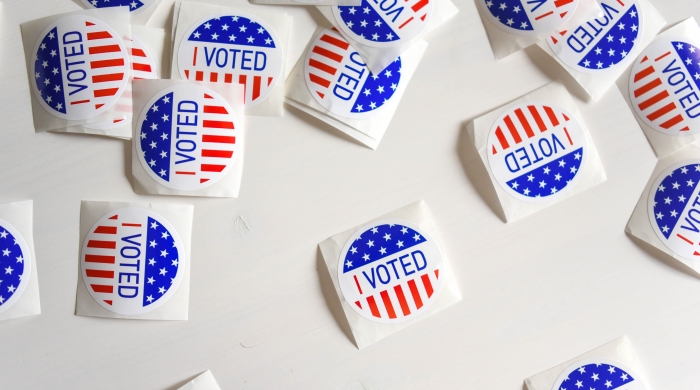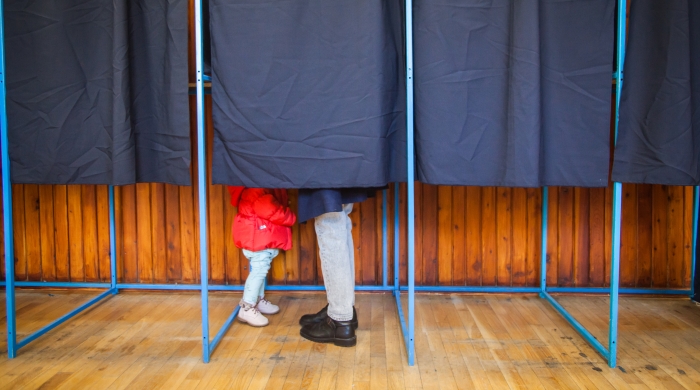
When Jennifer Garcia got to campus, she realized very quickly that things were about to get messy. The required on-campus event to which the MBA student was heading was not in the building she normally worked in, nor was it happening on a regular school day. If this doesn’t sound like a problem, it was: Jennifer was lactating, and the administrator who usually provided the lactation room key was clocked out for the weekend. As Jennifer lugged her breast pump and parts with her to the seminar, she tried to come up with a contingency plan. Maybe she could get the key herself from the office? No luck; the office was locked. Maybe one of the large bathroom stalls? Alas, no outlets nearby. Halfway through the 3-hour event, she started searching the building for a solution, eventually landing in front of the safety officer’s desk on the first floor.
“I explained to him that I need to use a lactation room,” Jennifer says. “He seemed confused and said he doesn't know where the room is. I told him I know where the room is, but I don't have the key.” Together, they try to find another room, then another key to the original room. Fifteen minutes pass, then 20, then 25; the safety officer, unfamiliar with any rules or regulations around lactation room use, asks for Jennifer’s ID to hold onto as collateral for using the room, prompting yet another rush up and down the stairs. “As you can imagine, this was pretty stressful; I missed a good portion of the workshop fumbling around with the officer and was getting engorged.” Jennifer spent 45 minutes of the mandatory workshop – time meant for learning communication strategies with her MBA cohort – trying to find a suitable place to pump milk for her 10-month-old.
These types of struggles happen often for parents who juggle breastfeeding with furthering their education. Of course, working moms are often incredibly resourceful, cobbling together assistance and resources as best they can. But does it have to be this hard?
Most people know that breastfeeding is good for moms and good for babies. Breastfeeding has been shown to reduce the risks and severity of infections in infancy and the risk of Sudden Infant Death (SIDS) by more than half. It lowers the likelihood of some reproductive cancers for mothers, like breast cancer and endometrial cancer. And breastfeeding promotes bonding and attachment for mother-child pairs. But how many people know that breastfeeding is also good for the institutions where mothers study and work? Recent studies have found that breastfeeding mothers have lower absenteeism and lower healthcare costs than mothers who exclusively use infant formula. And for institutions or companies with policies that support breastfeeding parents, there can be a boost in company loyalty and public image that make mothers less likely to go searching for better opportunities.
University-wide policies also promote equitable treatment at the administration level. If Jennifer had not been as comfortable asserting her rights and insisting on finding a place to pump – if she had been a first-generation college attendee, for example – she may have chosen not to ask for the accommodation at all, fearing backlash, stigma, or other negative consequences. And when accommodations are left up to the discretion of the individual faculty member, staff member, or administrator standing in front of the student needing to pump, almost by definition inequities will result. The leaky pipeline for mothers in academia is a very real phenomenon, and the challenges of parenting young children while getting a college degree can be insurmountable for students with fewer resources.
Despite the obvious benefits, very few universities currently have policies aimed at supporting lactating student-parents. A recent review found that only a handful of U.S. institutions had student-facing lactation policies on the books, with a few others having non-binding guidelines that suggest practices for support and protection. And even when resources are available, policies have to be widely disseminated for the whole campus community — including safety officers — to know how to access those resources.
“Policies are key to sustaining a successful breastfeeding-friendly campus initiative,” notes Dr. Michele Vancour, author of Breastfeeding Best Practices in Higher Education and former NYU student. “[T]hey outline the plan of action, set expectations and guide outcomes.”
Beyond cultivating a positive public image and reducing the likelihood of lactation-based discrimination, a comprehensive policy for breastfeeding workers and students can do something else that is important: it can change institutional climate and shift what people think of as normal. It says to students who are parenting, you belong here. Meeting students where they are is crucial, writes Dr. Vancour: “[S]tudents will embrace initiatives that address and support their needs for academic success.” With student retainment and success a top priority for most universities, helping students from diverse backgrounds and circumstances feel that they belong is a topic we need to be talking about.
The winds have started shifting, though. The Providing Urgent Maternal Protections Act (PUMP Act) – legislation that extends legal protection to more than 9 million U.S. workers currently exempted from employer lactation laws – is making its way through congress right now. But we shouldn’t forget that student-parents are working parents, too.
About the authors: Mackenzie Whipps is a 6th year doctoral student in the Psychology and Social Intervention (PSI) program in the department of Applied Psychology.
Related
The Intersection of Research and Civic Engagement
Politicians and voters continue to debate policies and issues tied to IHDSC’s areas of research. IHDSC surveyed our faculty affiliate network about the intersection of research and civic engagement.
Where Do Candidates Stand on Early Education Policy?
Early education policies, such as New York City’s Pre-K for All, have garnered attention on the 2020 presidential campaign trail. Support for free, high-quality early education must be contextualized within research in order to better understand why the education of young children matters and what these policies mean for our cities, states, and nation.



